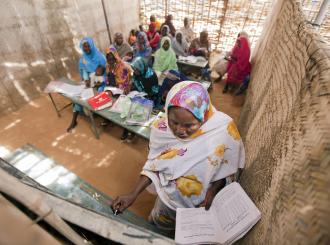
Marrakech, 25 March 2019 - UN Women, the Economic Commission for Africa (ECA) and the Ministry of Economy and Finance of the Kingdom of Morocco held a joint side event Saturday, March 23, 2019, under the theme: "Gender-sensitive budgeting: a strategic instrument for economic transformation and inclusive development in Africa".
Representatives of the Ministries of Finance and Economic Development of the Kingdom of Morocco, the Republic of Rwanda, and the Republic of Uganda, as well as international experts took part in this international event, which took place on the margins of the 52nd Session and Conference of African Ministers of Finance, Planning and Economic Development (COM2019), this international event
Participants analyzed the Gender Responsive Budgeting experiences of the Kingdom of Morocco, the Republic of Rwanda, and the Republic of Uganda, in order to understand their results and shed light on challenges and opportunities. In a presentation on his country’s pioneering experience in the field, Ahmed Berrada, Director of the Center of Excellence for Gender Sensitive Budgeting and Deputy Budget Director at the Ministry of Economy and Finance of the Kingdom of Morocco explained how the partnership between the Ministry of Economy and Finance of Morocco and UN Women, which exists since 2002, allowed Moroccan Budget Ministries to equip themselves with gender responsive budget programmes. This partnership enabled a number of Moroccan Ministries to define gender responsive budget programs to reduce inequalities, both directly and indirectly. This result stems from legal reforms with the adoption in 2015 of the Organic Law n ° 130-13 relating to the Budget Law which makes the GSB mandatory for each Ministry, institutional with the creation of the Center of Excellence in BSG, and finally technical with the production of guide and the creation of a knowledge management platform.
On access to property, land rights and constitutional review, Obald Hakizimana, an Economist at the Rwandan Ministry of Economy, Finance and Planning, gave an overview of the progress made in his country with regard to gender equality and highlighted the role of GRB in achieving gender equality and the steps taken to meet its targets. "There was a commitment from the Ministry of Gender and Family Promotion since 1995. In 2008, the GRB program was moved to the Ministry of Finance and Economic Planning. Four sectoral ministries have been selected and piloted, and since 2012, all ministries have implemented GRB," said Hakizimana.
For his part, the representative of the Republic of Uganda and Advisor at the Ministry of Finance, Planning and Economic Development Wilson Twamuhabwa quoted a study of the said Ministry which showed that the reduction of inequalities, and therefore the use of the BSG as fiscal instrument, can increase the GDP of the Republic of Uganda by 1.2% per year, and work towards sustainable and inclusive economic growth. Twamuhabwa said: "It is undeniable that inclusive growth is a prerequisite for sustainable development. Countries with the most equitable income distribution have reached the highest levels of development and well-being".
Katherine Gifford, a Governance and Planning Advisor at UN Women who supports nearly 80 countries on this issue, articulated her intervention around the prerequisites for scaling up the implementation of gender-responsive budgeting in Africa. Gifford emphasized the importance of political will, good inter-sectoral coordination, and the availability of data and statistics to ensure effective the monitoring and evaluation of gender responsive budgeting and programming. She also stressed that It is important to recognize that progress [on GRB] is not" all or nothing "and that it has different ways of triggering change.
These various interventions were followed by a presentation of the Nordic Africa Institute, on the link between BSG and access to justice.
The discussions focused on the opportunities for adoption of GRB as an innovative model of public funding for the achievement of development priorities in Africa. To this end, it was recommended to build on the successful experiences of each country, to create opportunities for exchange and cooperation to strengthen the community of practitioners of gender responsive budgeting in Africa.
Communication Team
Economic Commission for Africa
Office for North Africa
Tel: +212 (0) 537 548 749
Email: filali-ansary@un.org; cea.an.coms@gmail.com